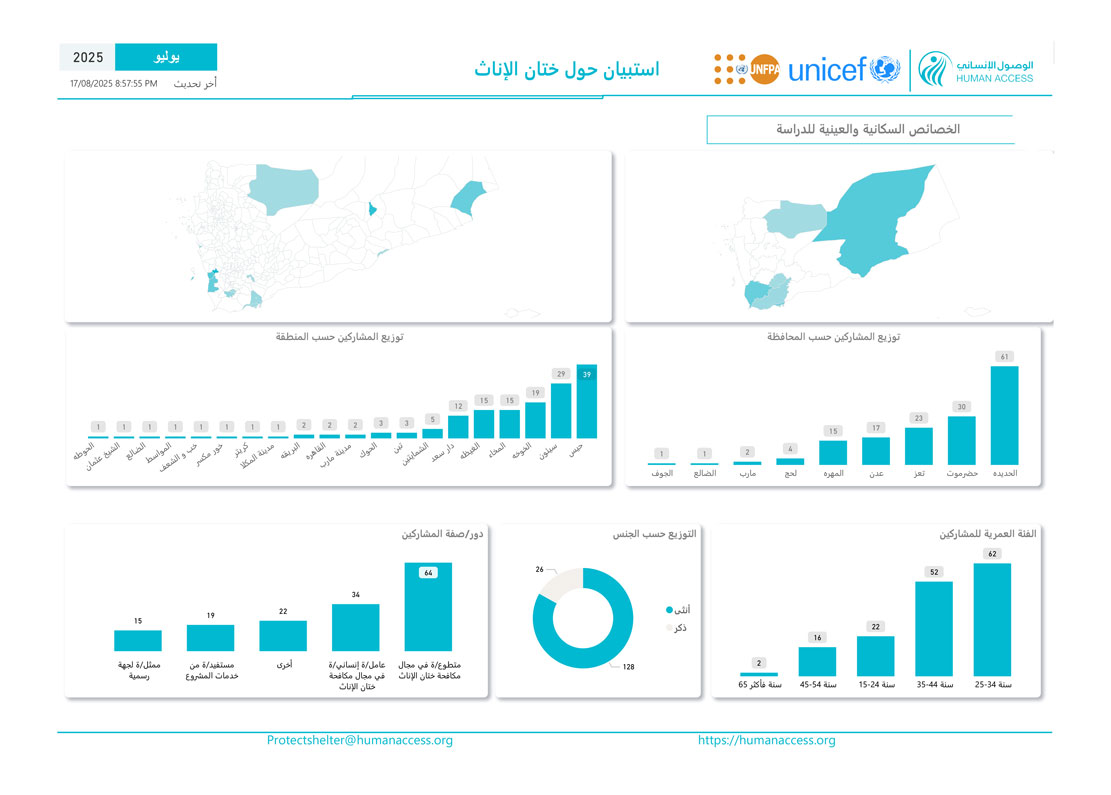
Human Access for Partnership and Development association published the results of a mini-study on community views on female genital mutilation (FGM) in Yemen. This study is part of local, international, and UN efforts to achieve our shared goal of ending FGM by 2030.
A major objective of this study was to assess awareness of female genital mutilation and community perceptions of it, to understand attitudes towards its continuation, and to identify the main reasons that make some communities adhere to it in spite of its serious consequences.
The study included 154 men and women from a number of Yemen’s governorates, representing diverse groups.
The study showed that 65% of those surveyed had moderate or comprehensive knowledge of FGM, while 8% had no knowledge of the practice. 28% of survey participants were aware of the laws criminalizing this practice, compared to 25% who had no knowledge at all.
107 survey participants attributed the continuation of FGM to social traditions and customs, while 90 participants attributed it to protecting chastity and purity.
Seventy participants believed that ignorance of the health and psychological effects of this practice was behind its continuation. Religious beliefs and familial and societal pressures emerged as supporting factors.
According to the study, 92% of those surveyed agreed that FGM has negative physical, psychological, and social consequences, while 88% believed that the practice should be completely stopped. This confirms that awareness of female genital mutilation is growing, despite gaps in knowledge of the laws.
The study conducted by HUMAN ACCESS found that access to health services is difficult and fragile, coupled with social stigma, making it difficult to protect girls from this practice. All of this constitutes a violation of the basic human rights of girls and women and a form of gender-based violence.
The study called for the rapid adoption of a national law criminalizing FGM, with strict enforcement mechanisms, and for strengthening awareness campaigns about this harmful practice. It also recommended involving religious and community leaders in awareness-raising efforts, focusing on schools, the media, and rural communities.
The study also recommended incorporating the risks of FGM into educational curricula and health education programs, providing specialized and accessible health services to affected girls, training health workers, and supporting field studies and research to track changes in community practices and attitudes.
Related articles
- Regular meeting for Children’s Ambassadors Network within FGM project
- Children's Ambassadors Network carries out field visits in Mukalla
- Agreements to publish awareness-raising media materials about FGM negative effects
- FGM project team visits the Ministry of Human Rights office in Seiyun
- Awareness sessions to combat female genital mutilations
- Using sign language among people with special needs to confront FGM


